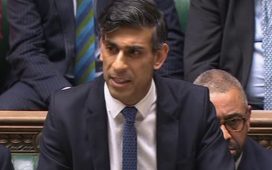
NHS workers are being tested at a drive-through site at an Ikea store in Wembley, north London
The government is facing growing pressure to ramp up coronavirus testing, as the UK saw its biggest daily increase in deaths.
Some 2,352 virus patients have died in hospital as of 17:00 on Tuesday – up 563 in a day, the latest figures show.
Prime Minister Boris Johnson said testing was “massively increasing” and it was “the way through” the pandemic.
Meanwhile a major international climate meeting, COP26, is the latest event to be postponed as a result of the virus.
The climate talks were due to take place at Glasgow’s Scottish Events Campus in November, but the venue is being turned into a temporary field hospital to treat coronavirus patients.
The UN’s climate body, the UNFCCC, and the UK government said the summit would be pushed back to 2021.
In a video message posted on Twitter, the prime minister said Wednesday had been a “sad, sad day” due to the high number of deaths in the UK.
Mr Johnson also reiterated the government’s commitment to “ramp up” testing, saying: “This is how we will unlock the coronavirus puzzle. This is how we will defeat it in the end,” he said.
‘Hundreds of thousands’ of tests promised
The government has been under pressure to increase the screening of medics, so that those who are self-isolating unnecessarily can return to work.
More than 3,500 NHS frontline staff in England and Wales have been tested for the virus since the outbreak began.
But cabinet minister Michael Gove said a shortage of chemicals needed for the tests meant the NHS – which employs 1.2m in England – could not screen all workers.
The prime minister’s official spokesman said the government was working with NHS England, Public Health England and other organisations to boost test capacity with an additional network of labs and testing sites.
Dr Yvonne Doyle, Public Health England medical director, told a daily coronavirus briefing in Downing Street that there was currently capacity for about 3,000 tests a day for frontline NHS staff.
She said the “intention” was for testing for frontline staff to increase from “thousands to hundreds of thousands within the coming weeks”.
‘Up-tick’ in car journeys
Dr Doyle said the UK was not in “as severe” a position as Spain, the US or Italy, but added there was “no reason to be complacent”.
She said while the spread of the virus was most advanced in London, the Midlands region – where more than 3,500 people have tested positive for the virus – was “obviously a concern” too.
Dr Doyle added while use of public transport had gone down since the government enforced social distancing measures, an “up-tick” in motor vehicle use in the last 24 hours was “slightly concerning”. She urged members of the public to stay home to “protect the NHS”.
Have things got worse?
Just yesterday health officials were talking about “green shoots” amid signs the virus maybe plateauing.
Yet today we have seen a big rise in deaths. Have things got worse?
Not necessarily. We know the number of deaths are going to go up – that is to be expected.
What matters is the trend over a few days – not what happens over the course of 24 hours.
Any signs of progress will be seen in the number of cases first.
For the past five days the new cases has been hovering between 2,500 and 3,000 each day.
Now it has gone up by 4,300. That is a substantial rise, but over the course of the past week the trajectory has still slowed from what it had been.
All eyes will be on what happens in the next few days to see if the hope of a slow down was misplaced.
Read more from Nick on how to understand the coronavirus death toll.
A doctor who came out of retirement to volunteer for the NHS became the fourth UK medic to die with the virus.
Dr Alfa Sa’adu had been volunteering at Queen Victoria Memorial Hospital in Welwyn when he contracted coronavirus, which causes the disease Covid-19.
His son Dani Saadu posted online that his dad had died after “fighting the virus for two weeks”.
“The NHS were amazing and did everything they could,” he said.
“My dad was a living legend, worked for the NHS for nearly 40 years saving people’s lives here and in Africa.”
The BBC’s head of statistics Robert Cuffe said the latest increases in the number of patients dying with coronavirus balance out with the below-average rises on Sunday and Monday.
He said the number of new deaths has been increasing at a slightly slower rate than earlier in the epidemic, “but if that keeps up, we’d expect to see in the region of a thousand deaths a day by the weekend”.
Joining Dr Doyle in the Downing Street briefing, Business Secretary Alok Sharma said financial support packages introduced by the government were beginning to help ease the economic impact of the pandemic on businesses.
He said: “Just as the taxpayer stepped in to help the banks in 2008, we will help the banks to do everything they can to repay that favour and support the businesses and people of the UK in their time of need.”
Mr Sharma added Chancellor Rishi Sunak would give more information “in the coming days” on how businesses will be supported further.

Media playback is unsupported on your device
Downing Street said 390 million pieces of personal protective equipment (PPE) including masks, alcohol wipes and aprons, have been delivered to NHS staff over the last two weeks.
The prime minister’s official spokesperson said the government was working with a number of suppliers which had come forward with offers of PPE, or proposals to manufacture more.
It follows criticism from some frontline workers over the lack of protective equipment, with staff at one hospital in Essex warning they could “limit services” to patients with coronavirus “to a bare minimum” over fears for their own safety.

Media playback is unsupported on your device
The prime minister’s spokesperson also said the NHS will be sent 30 new ventilators next week and promised “hundreds” more would follow.
The NHS is reported to have 8,175 ventilators and the government believes up to 30,000 ventilators could be needed at the peak of the pandemic.
In other developments:
- Commons Speaker Sir Lindsay Hoyle has written to Jacob Rees-Mogg, Leader of the House of Commons, to ensure Parliament can operate “virtually” in the event social distancing measures remain in place on 21 April, when MPs plan to return to work
- Defence Secretary Ben Wallace became the fourth cabinet minister to have to self-isolate
- In the past 15 days, NHS 111 has responded to more than 1.7 million inquiries from people concerned they might have symptoms of coronavirus
- Wimbledon has been cancelled for the first time since World War Two because of the pandemic
- All Champions League and Europa League matches have been suspended “until further notice” by Uefa
- The Edinburgh Festival, due to take place in August, has also been cancelled
- The Ministry of Defence said 80 armed forces personnel would be sent to staff ambulances and 999 call centres across Berkshire, Buckinghamshire, Hampshire, Oxfordshire, Sussex and Surrey
- Some of the UK’s biggest banks have agreed to scrap dividend payments and hold onto the cash, which may be needed during the coronavirus crisis
- New research suggests a loss of smell or taste may be a sign that you have coronavirus
- The DWP say there have been 950,000 new Universal Credit claims from the mid-March shutdown until 31 March – the normal figure for a two-week period is 100,000
- Pregnant prisoners could be granted temporary release from prison “within days” to protect them and their unborn children from the virus.
Do you work in the NHS? Have you been tested? Share your experiences by emailing haveyoursay@bbc.co.uk.
Please include a contact number if you are willing to speak to a BBC journalist. You can also contact us in the following ways:














